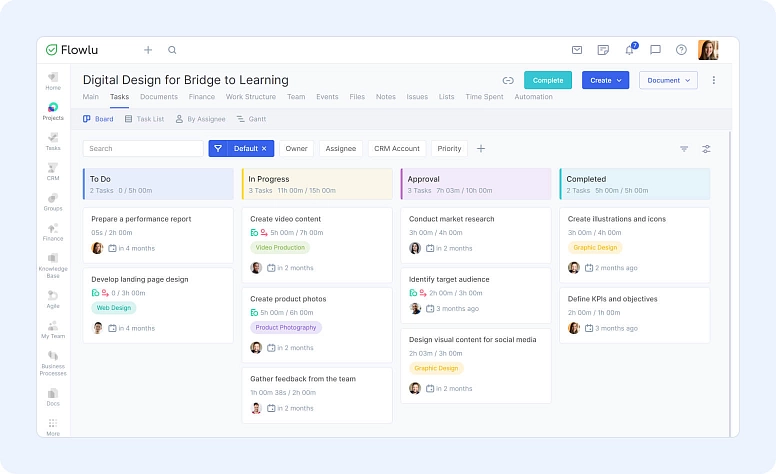How to Make Your Team Accountable: Simple Strategies and Best Practices
- What Is Employee Accountability?
- 4 Major Impacts of a Lack of Accountability
- The Biggest Challenge of Holding an Employee Accountable
- 10 Best Practices for Holding Employees Accountable
- Building an Accountability Culture
- 4 Long-Term Benefits of Accountability
- How Flowlu Supports Accountability
- Bottom Line
Every business owner wants a successful and productive team. But this is not possible if people don’t take responsibility for their work, and know how to hold a team accountable. Accountability is what keeps everything running: deadlines met, tasks done, and goals achieved.
Still, many managers struggle with it. Some are too soft and let delays happen. Others push too hard and start micromanaging. Finding the right balance is not easy.
In this article, you will learn how to make your team accountable in a simple and healthy way.
What Is Employee Accountability?
Before learning how to hold your team accountable, it’s important to understand what employee accountability is in the first place.
Simply put, employee accountability can be defined as the way the employee manages his time to meet deadlines, reach targets, comply with team goals and objectives, deliver on commitments, and ultimately be responsible for what he does—good and bad.
As you can easily understand, having an accountable workforce involves having your employees working toward your company goals and objectives. Mistakes and errors aren’t put aside. They are embraced and acknowledged, which means they can be integrated to ensure they won’t happen again. This is a keep-learning type of management.
4 Major Impacts of a Lack of Accountability
A recent Gallup study found that only 21% of employees feel strongly accountable for their work when expectations are not clear. Another report by McKinsey shows that companies with strong accountability cultures are 1.5 times more likely to have above-average financial performance. When a company or business doesn’t have an accountability culture, there are four main impacts that will affect your organization.
#1: Poor Work Quality
When the company doesn’t have an accountability culture, it’s normal for employees to start neglecting attention to detail or even begin cutting corners. This will obviously lead to low work quality. As a consequence, you’ll need to deal with problems with your overall customer satisfaction and reputation.
#2: Lack of Trust
Another impact of no accountability is the lack of trust between management and team members. If employees see that they can do what they want without repercussions, they won’t believe in management’s ability to lead them.
#3: Lower Productivity
If each employee is working on his own, with only his goals in mind, he is paving the way for delays, inefficiencies, and, overall, a decrease in productivity. As you can easily understand, this will slow down the entire company or business.
#4: Low Employee Morale
Just think of an employee who failed to meet a deadline but nothing happened. There were no consequences. The rest of his team will automatically become demoralized. After all, it doesn’t pay off to perform well.
The Biggest Challenge of Holding an Employee Accountable
While it seems that the most difficult part is defining employee accountability, the truth is that it’s the easiest. The difficult part is actually knowing how to hold your team accountable for results. Managers need to enforce it, but they can’t suffocate the team. You need to find the right balance between the two.
What tends to happen in many companies and businesses is that when the project manager doesn’t interfere, tasks take more time to be completed and deadlines are often missed. On the other hand, when he steps in and holds the employee accountable, he notices that he is overly monitoring the team and even micromanaging.
So, what’s the secret? How do you hold your team accountable without micromanaging?
Accountability without micromanaging is certainly possible, but it usually takes some time for managers to do it properly. Even though the manager’s intentions are always good (he wants to ensure tasks are completed and deadlines are met, errors are minimized, and quality is enforced), he needs to understand that he shouldn’t interfere too much with the team’s work.
Why? The team will start to see him not as a manager, but as a person who watches everything they do. Some of the consequences you, as a manager, will need to deal with if you start micromanaging include:
- The team morale will be negatively affected since you’ll be showing them that you don’t trust them.
- Bottlenecks will start to appear. As the team feels they are being questioned all the time, they’ll become frustrated, and their efficiency will decrease.
- Creativity and innovation will be reduced because no one will be motivated to do any. Why should they think outside the box if the manager questions everything?
- An increase in employee turnover is likely to occur since employees aren’t interested in maintaining a job where they don’t feel comfortable.
- Constant criticism can often lead to stress and, in some situations, burnout. Mental illnesses are increasingly common, and it’s important to avoid them in the workplace. But note that burnout isn’t a consequence exclusive to employees; managers can also develop it. After all, they’re always checking on what the team is doing, which makes it harder and harder to focus on their own work.
While it may be difficult to achieve a balance between accountability and micromanagement, you can certainly have accountability without micromanaging in a company.
For example, think about a sales manager named Ana. Her team regularly missed deadlines, and she used to check every small detail. The team felt watched all the time. Then she started using Flowlu to set clear weekly goals and track progress without asking every hour. After one month, her team finished 95% of tasks on time, and people said they felt less stress.
10 Best Practices for Holding Employees Accountable
If you’re looking to learn how to hold employees accountable without micromanaging, make sure that you check the following tips:
#1: Use SMART Goals:
Setting SMART goals or Specific, Measurable, Achievable, Results-oriented, and Time-bound goals is crucial. When your employees have clear goals and expectations, it will be a lot easier to reach the goal completion.
#2: Help Employees With Coaching And Support:
When you want to have employees who are accountable, you need to provide them with the tools that allow them to reach this goal. You need to give them all the SOPs, procedure manuals, and processes documentation that allow them to do their work and be accountable.
#3: Practice Leadership By Example:
Nothing works better than leading by example. Instead of telling your employees how to do things, show them how you do it. Make sure that you meet your deadlines, set clear expectations and goals, and take responsibility for your actions and decisions. This will encourage your employees to be accountable, but it also increases both trust and transparency.
#4: Performance Tracking:
When you’re looking for ways on how to keep your team accountable, you need to ensure that you keep track of progress as well as you measure performance against the goals you have previously defined. Responsibility and results tend to walk hands together.
Want to see your team’s results live? Use Flowlu’s Business Dashboard to track tasks, projects, and progress in real time. It helps you spot delays early and keep everyone accountable without micromanaging. Read: Guide to Building a Business Dashboard
Example: In a marketing team, the manager used Flowlu to follow project progress. Everyone could see the status of each task on the dashboard. This made it clear who was late and who finished early. After two weeks, team productivity went up by 20%, and people said they liked seeing real progress in one place.
#5: Help But Don’t Solve:
You shouldn’t give the fish; you should teach them how to fish. This is the way a manager should always act whenever an employee has a problem or issue. Even though you may want to help and you know the solution for it. It is wiser to point him in the direction of where he can get the information. By doing this, you’re actually helping your employees take the responsibility of finding the solution for their own concerns; you’re developing their proactive problem-solving skills.
#6: Feedback And Recognition:
Both feedback and recognition are very important for accountability. The truth is that an employee needs to know how he is performing on a daily basis, not at the end of the year, for example. Ongoing feedback is crucial to ensure that all employees know where they are standing and where they should be.
When we talk about feedback, we’re not only talking about negative feedback. It is incredibly important to recognize the work of employees who are doing a good job. This doesn’t only positively affect the employee in question, as it will motivate his co-workers to improve to be recognized in the near future.
Another aspect to take into consideration is that feedback should be reciprocal. Employees should receive it, but they should also give feedback to managers. It’s essential for employees to know they can talk freely.
#7: Provide The Right Training:
You can’t expect an employee to meet all your goals and expectations without the tight training. Only then you may evaluate the employee efficiency and accountability.
Store SOPs, process docs, and training videos in Flowlu’s Knowledge Base. It’s the best way to keep all resources in one place for easy access.
#8: Open Communication Is Key:
It’s significant that communication exists in the workplace. For the good and for the bad. While all employees want to get positive feedback and recognition, sometimes, an employee may be having a poor performance. And this should never be ignored. However, the problem needs to be addressed constructively and as soon as you can.
Regular check-ins are important in these situations, but there are other things you can do to try to understand what’s happening and improve the situation:
- Determine the cause of the poor performance. It may be a lack of the right training, a lack of communication, priorities may not be set, unclear instructions, among others.
- As the manager, you need to always ask yourself if you did anything wrong such as assigning a task the employee wasn’t able to complete, if you set an unrealistic target, or even if you failed in providing the guidance he needed.
- Ask your employees if they are aware they are underperforming and listen to what they have to say.
- From all the above, you can now come up with a plan to help your employee regain performance and productivity.
#9: Never Low Work Standards:
Some managers have a real hard time dealing with accountability or the lack of it in some employees. So, sometimes, they believe it will be easier to simply lower the standard or expectations. By doing so, there won’t be any confrontation. However, this is a very bad call. When you do this, you’re telling employees that accountability isn’t important.
#10: Consequences And Rewards:
Just like when you were a child you were entitled to a biscuit or a cookie when you did something well, or you would be sent to your room when you behaved badly, employees also need to have consequences and rewards for the work they deliver.
When an employee keeps receiving negative feedback, and he simply ignores all the training provided, you’ll need to make a tough decision. You may still offer him the opportunity of reassigning a task, but if the behavior continues, you may end up firing him.
Building an Accountability Culture
Accountability doesn’t happen in one day. It grows slowly when managers and employees share the same goals. To build this kind of culture, make responsibilities clear and simple. Everyone should know what they are doing and what results are expected.
Good communication helps a lot. When people talk openly, they fix problems faster and avoid confusion. It’s also helpful to share small success stories so others see what good accountability looks like.
Managers should show that mistakes are okay when people learn from them. This makes the team feel safe to be honest and take responsibility for their actions.
Tools like Flowlu make this easier by keeping goals, tasks, and feedback in one place. Everyone can see what’s going on, which builds teamwork and trust.
4 Long-Term Benefits of Accountability
#1: Improve Trust & Team Collaboration
Accountability helps team members trust each other because there is a sense of mutual responsibility. This, in turn, increases reliability since an employee can depend on another to complete his tasks. As accountability grows, collaboration grows as well, since team members will be more willing to share knowledge and even share responsibilities so that they can all reach their common goal.
#2: Boost Productivity
When you have an accountable employee, he takes ownership of both his tasks and responsibilities. Besides, when he knows exactly what is expected of him, he is more likely to manage both time and resources more efficiently.
#3: Enhance Problem-Solving
As mentioned above, you should teach an employee how to fish. By doing so, you’ll be teaching him how to find solutions to his problems. This may also lead to creative solutions since the employee is motivated to think outside the box.
#4: Better Employee Engagement
Employee accountability is crucial to give the employee a sense of both empowerment and ownership. As the employee feels that he is important for the company to meet its overall goals, it’s normal that he may feel more committed and motivated to keep contributing to the success of the company.
How Flowlu Supports Accountability
Flowlu helps teams stay accountable in daily work. You can assign tasks with deadlines, track time, and keep all training materials in one knowledge base.
Managers can see progress in real time and notice delays before they become problems. Reports show who’s responsible for what and how projects are moving, so feedback is fair and fast.
With Flowlu, accountability is part of everyday work and not extra work.
Bottom Line
There’s no question that if you want a high-performing team, it needs to be accountable. However, this doesn’t mean that you need to micromanage your team — in fact, it’s quite the opposite.
Ultimately, it is the manager’s job to ensure that employees can take responsibility for their work in a natural way. They shouldn’t be forced into it; they should be driven to it, and that’s quite different. As a manager, you’re responsible not only for setting expectations, but also for delivering the right training to your employees.
It’s always important to keep in mind that team members need to be frequently evaluated. If they do a good job, they should be recognized for it; if they perform poorly, there should be consequences.
Try Flowlu to make accountability simple. Start with one project, set clear goals, and track progress — you’ll see how quickly your team becomes more responsible and motivated.
It’s important to come up with team accountability strategies. However, remember that you will only see an increase in productivity, trust, creativity, and innovation when your team is accountable, but you’re not micromanaging. You’re not there to control your team — you’re there to help your team succeed. And that’s completely different.
You may expect many benefits. However, the most important ones include better decision-making, greater innovation, increased productivity, and stronger trust and collaboration.
Many managers think accountability means controlling everything. This is a big mistake because it can turn into micromanaging. Another mistake is when goals are not clear: if employees don’t understand what they need to do, they can’t be responsible for it. Also, some managers forget to give feedback or say thank you for good work, and this makes employees feel less motivated.


















